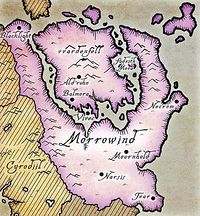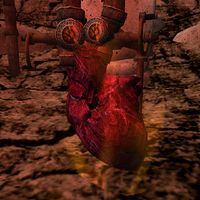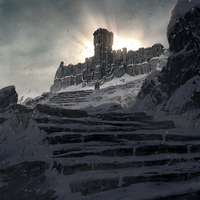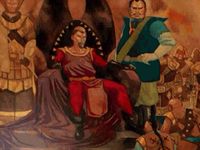Lore:Wulfharth
| High King Wulfharth | |||
|---|---|---|---|
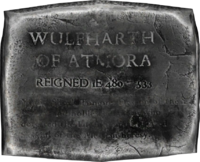 High King Wulfharth plaque in Windhelm
High King Wulfharth plaque in Windhelm |
|||
| Race | Atmoran | Gender | Male |
| Born | Atmora | ||
| Died | 1E 533 |
||
| Undeath | 1st Era |
||
| Last Known Death | 2E 896 Imperial City |
||
| Resided in | Skyrim | ||
| Reign | 1E 480- 1E 533 |
||
| Previous Ruler | Hoag Merkiller | ||
High King Wulfharth or Wulfrich[UOL 1] (also known as Ysmir, Dragon of the North, Shor's Tongue, Kyne's Son, the Ash-King, the Breath of Kyne,[1] the Storm of Kyne, the Grey Wind, the Kingmaker,[2] Spirit Wulfharth,[3] Ra'Wulfharth,[4] Lord of Solitude,[UOL 2] the Raised King,[UOL 3] and the Underking)[2][5] was an Atmora-born High King of ancient Skyrim who came to power after the death of Hoag Merkiller at Glenumbra Moors.[1][6] He submitted Skyrim to a fiery reinstatement of the traditional Nordic pantheon, destroying Alessian temples and forcing the remnants of its priesthood to seek refuge in the Heartland.[1] He was also famed for driving the Direnni clan out of Skyrim.[7]
Legends claim that an evil god once made him (and all of Skyrim) into children, and when Wulfharth found a way to cure his people, he inadvertently made himself extremely old and died (for the first time). He led the invasion of Resdayn (modern-day Morrowind) and fought at the Battle of Red Mountain, where he was killed again.[1]
During the Interregnum, he was revived yet again by either Almalexia or The Skald-King Jorunn to fight against the Akaviri invaders of Skyrim and Morrowind. Though his official story ends here, The Arcturian Heresy claims that Wulfharth reincarnated as the Ash-King following this battle, an undead warrior bent on destroying the Mer and ruling Tamriel.[2][8]
Contents
History[edit]
Early Life[edit]
Little is known of Wulfharth's early life. It is said he came from the icy continent of Atmora.[7] Representing the Nordic Empire, Wulfharth fought against the alliance of Chimer and Dwemer known as the First Council.[9] He possessed incredible supernatural abilities that he used to upend and totally destroy many Chimeri villages and Dwemeri strongholds.[9] Wulfharth was ultimately driven back when he faced off against the Chimer Hortator Nerevar, who grabbed his shouts by hand until his power throat bled. The shouts were subsequently given to Vivec, who bound them into an ebony listening frame. This listening frame was placed on Wulfharth's head, which drove him mad and turned him away.[9] This planted the seed for the passionate, undying hatred that Wulfharth would come to have for Almsivi.[2]
High King of Skyrim[edit]
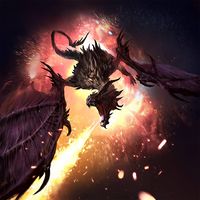
Most of what is written about the early lives of King Wulfharth comes from ancient Nord legends collected in Five Songs of King Wulfharth. His (purportedly autobiographical) story continues in The Arcturian Heresy, though the veracity of these works cannot be determined (and in one instance, two contradictory versions of the same story exist).
Wulfharth was named High King of Skyrim by the moot in 1E 480 or 482.[nb 1][10] He is said to have been a Dragonborn[11] who possessed an extremely powerful Thu'um. This allegedly prevented him from verbally swearing into office and meant scribes had to issue his oaths for him.[1] His first new law issued and carried out was a fiery reinstatement of the traditional Nordic pantheon. The Alessian Edicts were outlawed with their priests being put to the stakes and their halls set ablaze.[1] Some of this punishment was dished out by Wulfharth himself with him Roaring many of them straight past the Underworld into Hell.[UOL 4] The Shadow of King Borgas was lifted.[1] Because of The High King's mighty voice and rejection of the Alessian pantheon, the Nords dubbed him Shor's Tongue and Ysmir, meaning "Dragon of the North."[nb 2][1]
There are many tales of Wulfharth's deeds as High King, both mundane and mythical. It is said he rid Skyrim of the Direnni,[7] fought the eastern Orcs and defeated their chief with a shout, repaired the 418th step of High Hrothgar after it was destroyed by a Dragon, and even swallowed a thundercloud—a deed which earned him the name Breath of Kyne[nb 3].[1] However, particular attention is given to the tale of his death. Ysmir and the Orcish god Orkey, the Old Knocker, were known for their legendary battles,[12] and one such battle saw Orkey summon the ghost of Alduin the Time-Eater, who ate the Nords down to six years old.[1]. Wulfharth summoned the ghost of Shor to fight Alduin, and in the process learned a new thu'um to restore the Nords to their proper ages.[1] Unfortunately, while using this shout, the High King advanced his own age too far, and died.[1] The tales say the flames from Wulfharth's funeral pyre "reached the hearth of Kyne itself."[1] Wulfharth and his high throne was seemingly succeeded by at least one son as the reign of himself and his son's was used as an interval of time of the passing of Mordrin Hanin.[13] His legacy was also felt in the form of a Longboat Legion in Haafingar known as the Wulfharth Heirs.[14]
One story speaks to a king of men and dragons alike by the name of Ysmir the Forefather who upon death, ascended to Aetherius and took his place in the heavens as The Warrior Constellation.[UOL 5][UOL 6] This story became associated with Ysmir Wulfharth although scholars were skeptical if the story was truly literal, instead finding it more likely that Wulfharth was associated with the Warrior constellation as it represented his own strength as a warrior, and became only further associated with it after his death.[15]
The Ash-King at Red Mountain[edit]

The tales of King Wulfharth pick up again about a century later. As with most stories of the Battle of Red Mountain, the Nordic account presents a unique cultural take on events.
The peace between the Devils (Chimer) and the Dwarves (Dwemer) of Resdayn (later renamed Morrowind) had begun to fail.[1] The Nords, sensing an opportunity, made plans to retake the eastern lands that they had lost after the War of Succession, but decided not to act, as they lacked a strong king to lead them.[1][16][17] This changed when the Devil of Dagoth (Voryn Dagoth, the future Dagoth Ur) visited the Nords, claiming the unrest in Resdayn was due to the discovery of the Heart of Shor (Lorkhan),[18] and that he knew where to find it. The Devil of Dagoth played on the Nords' prejudices to gain their trust, and so the users of the thu'um "sung" the ghost of Shor back into Skyrim.[1] The god amassed a great army, but needed a general; to this end, Shor gathered the ashes of King Wulfharth and returned him to life as the Ash-King.[1] Shor, his armies led by the Ash-King and Dagoth, marched on the eastern kingdoms in 1E 668, the Year of Sun's Death.[nb 4][1]
However, the Devil of Dagoth had betrayed the Nords; the Heart of Shor wasn't in Resdayn, and had never been.[1] Once Shor and his armies reached Red Mountain, the combined armies of the Dwarves and Devils attacked and slaughtered them.[1] Devil sorcerers "lifted the mountain and threw it onto Shor", trapping him there for all time.[1] Wulfharth was able to slay the Dwemer King Dumalacath (Dumac) the Dwarf-Orc, but was himself blasted back into ash by the Devil Vehk (Vivec).[1] It is said that Kyne lifted Ysmir's ashes back into the sky to remind the Nords to never again trust the Devils.[1]
The Sermon of Vivec[edit]
Vivec's 36 lessons feature a different perspective on the battle.
In this recounting of the battle, Dumac Dwarf-Orc along with Kagrenac the Blighter align with the Nords, led by Ysmir Wulfharth. Nerevar slew King Dumac but he himself perished when he went too far into Red Mountain looking for the Sharmat. Kagrenac then revealed what he had been building in the image of Vivec, the walking star Numidium which was mighty enough to destroy the armies of the Triune and create the Inner Sea. In response to this, Almsivi united as one and rose up to destroy the Brass God and when the soul of the Dwemer could walk no longer, they were removed from the world and the battle was over.[19]
The Tale of Dro'Zira[edit]
The Khajiit have their own tale of the events of the battle which heavily involve Wulfharth.
According to this tale, the roar of Alkosh was heard by the Khajiit who raced to him and devoted themselves to him as his greatest warriors forming the Pride of Alkosh. Lorkhaj (Shor in the Nordic) was jealous of their devotion to Alkosh and thus gave his roar to Ra'Wulfharth to spite them. Ra'Wulfharth had some level of respect for the Khajiit warriors and so instead of putting them to death, used his mighty roar to speak to Masser and Secunda, to move their fullness in the sky, changing all of the warriors to Senche however Lorkhaj then stripped them of all reason.
When Ra'Wulfharth set his sights back towards Red Mountain, he called upon all of his people to aid him, and a Senche known as Dro'Zira was the only among the "Rhojiit" who still remembered and thus was the only one to answer the summons. Ra'Wulfharth rode upon Dro'Zira at the battle who pounced upon Dumalacath Dwarf-Orc when he had his blade to the throat of the Ash King so he couldn't roar. Following the battle Lorkhaj returned Dro'Zira from the lands of Sheggorath for saving Ra'Wulfharth.[4]
The Secret Song[edit]
—Five Songs of King Wulfharth
An apocryphal version of the events at Red Mountain also exists, purporting to be "the truth."[1]
In this account, Voryn Dagoth had not lied, and the Heart of Shor actually was in Resdayn as promised.[1] However, as the Nords massed at the edge of the Inner Sea the Chimeri armies had only just left Narsis, apparently delaying their march.[1] According to Dagoth, the Chimer were moving so slowly because the Tribunal believed that peace with the Dwemer would ruin their way of life.[1] They had betrayed Nerevar's trust, and sent Dagoth to Skyrim to find Lorkhan (as Shor) so that he "might wreak vengeance on the Dwarves for their hubris."[1]
Shor indeed vowed to wreak vengeance on the Dwemer and those who stood with them, but for his own reasons.[1] The god knew that Nerevar was a friend of Dumac,[20] and the ensuing battle would be difficult despite the Tribunal's interference.[1] They needed more troops; Ysmir made allies with the Nords' old enemies, the Orcs, while Dagoth assembled the forces of the Sixth House.[1] The battle was joined, but many Nords couldn't bear being allies with their old enemies.[1] With this army close to desertion, Wulfharth rallied the Nords with his words.[1] Those who realized what the battle meant and what was actually happening stayed and fought.[nb 5][1]
In the climactic battle, Shor and his generals met the Kings Nerevar and Dumac, and Nerevar's shield-companion[21] Alandro Sul.[1] At some point, Shor had been able to regain his Heart but remained in a weakened state; Nerevar and his companions each wielded one of Kagrenac's Tools.[1] Sul felled the Ash-King, but not before Wulfharth was able to shout his opponent blind.[1] Dumac managed to strike Shor in the Heart with Sunder, making it solid, before being killed by Dagoth.[1] Upon seeing his friend struck down, Nerevar slew Dagoth, but was mortally wounded by Shor in the process.[1] As he lay dying, Nerevar managed to strike at the god and cut out his Heart with Keening.[1] The death of Shor brought an end to the battle, and the song ends there.[1]
Epilogue[edit]
The story of the Ash-King at Red Mountain concludes in The Arcturian Heresy.
Some time later, Wulfharth came to and staggered out of Red Mountain to earthquakes and a land on fire—the eruption of Sun's Death.[2][22] The Ash-King could not maintain his mortal form with Lorkhan dead (again); he reverted to ash, and the wind bore his remains back to Skyrim.[2]
The Grey Wind[edit]
Following the death of Lorkhan at Red Mountain, Wulfharth had changed; he was no longer a Nord (or Atmoran), but something else entirely, sometimes appearing as a storm cloud.[2] His motivations had changed as well, consumed with a desire to kill the Tribunal.[2] The Nords called Ysmir's new incarnation the Grey Wind, the Storm of Kyne.[2] At some point in this period, Ysmir the storm led another invasion of Morrowind.[2] However, the Dunmer and their new gods, the Tribunal, had grown too powerful, so Wulfharth went to sleep underground for a time to reform his body and regain his strength.[2]
Wulfharth was reawakened and returned to Tamriel in 2E 572 to assist in repelling the Kamal king Ada'Soom Dir-Kamal at the Red Mountain, when he attempted to conquer Morrowind during the Second Akaviri Invasion.[2] Some sources say Jorunn the Skald-King summoned the Ash-King from Sovngarde with a shout taught to him by the Greybeards to fight at his side against Dir-Kamal.[8][23] Others yet that it was the Greybeards themselves that summoned Wulfharth for Jorunn.[24] Some claim, oddly enough, that he was summoned by Almalexia herself to assist his hated enemies, the Tribunal.[2][5] Some of these sources also give Wulfharth a new title—the Underking. Wulfharth played a large role in rallying the Nords during the battle as Jorunn was still a youthful warrior.[25] After the battle, the Underking returned to Sovngarde to sleep again for nearly three centuries.[2][8][24]
The Underking[edit]
The Underking was an undead entity widely known and feared throughout Tamriel in the Third Era, though most sources state that in life, he was Zurin Arctus, Imperial Battlemage.[26] While most of Wulfharth's claims in The Arcturian Heresy run contrary to the accepted historical record, some details are corroborated by other sources.
Near the end of the Interregnum, Wulfharth the Underking was awakened by the Greybeards, who spoke a prophecy—a new Emperor would come to defeat the Elves and unite Tamriel under his rule.[2] Given his goal of destroying the Tribunal, Wulfharth traveled to High Hrothgar to see if he was the chosen one.[2]
He was not. When the Greybeards spoke, their voices blasted his body to ash again.[2] As the ashes scattered, the Greybeards warned Ysmir to beware of betrayal.[2]
The prophesized one was a young Breton named Hjalti Early-Beard, a warrior from the island kingdom of Alcaire in High Rock, who would one day rule Tamriel.[2][27][28][29][UOL 7] He was a general, leading the armies of Cuhlecain, King of Falkreath in the Colovian Estates.[2][30] One night during the Battle of Old Hrol'dan, Wulfharth appeared to the general as a storm and allied with him.[2] At dawn, Hjalti led an assault of Colovian troops and their Nord berserker allies, protected from enemy arrows by the whirling winds of Ysmir.[2] He then shouted down the walls, which allowed his forces take the town.[2] After this victory, the Nords dubbed Hjalti Talos, meaning "Stormcrown."[2]
With Ysmir's counsel, protection, and thu'um at his disposal, Hjalti was invincible; Cuhlecain's armies were able to conquer West Cyrodiil in under a year.[2] The Eastern Heartlands were next, and were taken in 2E 854.[2][30] Cuhlecain prepared to be crowned Emperor, but he and his loyalists were assassinated—on Hjalti's orders.[2] Instead, the general had himself crowned Emperor of Tamriel, taking the Cyrodiilic name Tiber Septim.[2]
The conquests continued, and eventually only the Elven lands remained apart from the Empire.[2] Wulfharth reminded the emperor of his destiny, and advocated for a full-scale invasion of Morrowind to crush the Tribunal, steal their power, and use it to conquer Lorkhan's oldest hated enemies, the Altmer of the Summerset Isles.[2] However, the Empire and Morrowind instead agreed to an armistice, which allowed the Dunmer to retain their religion and way of life.[2] The Underking believed this to be the betrayal the Greybeards warned him of, and abandoned the Empire in disgust.[2] However, that betrayal was yet to come.
The Betrayal[edit]
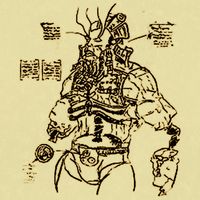
As part of the Armistice, the Tribunal gave the Empire Numidium, a colossal Dwemer construct. The automaton didn't function, so Tiber Septim tasked his Imperial Battlemage, Zurin Arctus, with repairing it.[2] Arctus pored over ancient Dwemer plans, and discovered that Numidium was a fearsome weapon powered by the Heart of Lorkhan.[2] He also learned of events surrounding the Battle of Red Mountain, of the Underking's involvement, and of his divine nature.[2] But the plans he had were incomplete, and Arctus deduced (incorrectly) that the "heart" of Lorkhan referred to the deity's life force—and by extension, that of Wulfharth, Lorkhan's mortal avatar.[2] Most importantly, he knew how to harness that power.[2] Arctus reported this news to the emperor, and Tiber Septim realized Numidium would enable him to conquer the elves and fulfill the prophecy.[2] The plan still required the Underking's "heart,"[26] so the Emperor and his Battlemage set a trap.[2]
Meanwhile, the estranged Underking had discovered why Morrowind's Tribunal had so readily agreed to the Armistice—they were cut off from the Heart of Lorkhan.[31] Dagoth Ur had returned after centuries of sleep beneath Red Mountain and taken control of the Heart Chamber at the mountain's core.[31] He planned to use the Heart not only to make himself a god, but to conquer Tamriel by constructing a second Numidium.[2][31] When word came the Empire needed him back, Wulfharth complied, as he would need its armies to combat the new threat in Morrowind.[2]
Upon returning to the Imperial City, the Underking was ambushed by Zurin Arctus and the Imperial guards.[2] The Battlemage cast a soul trap spell on Wulfharth, and as the Underking was cut down his divine heart was sucked into a massive soul gem, the Mantella.[2] However, as Wulfharth's soul was transferring to the Mantella, it tore a hole though Arctus' chest, killing him.[2] The Underking reverted to ash once more.[2] When the Elder Council arrived, Tiber Septim told them Zurin Arctus had been killed while attempting a coup; the Underking and the fallen guards were hailed as heroes.[2]
While the Underking was "not exactly Lorkhan", his heart was sufficient to power Numidium, and in 2E 896 it was used to conquer the Summerset Isles, fulfilling the prophecy of a united Tamriel.[2][32] However, shortly after the battle was won a "rotting, undead wizard"[nb 6] appeared in the sky and attacked Numidium; both were apparently destroyed in the process.[2]
Tiber Septim declared the start of the Third Era and ruled for nearly four more decades.[32] Shortly after Tiber's grandson Pelagius I took the throne, he was visited by the Underking, who explained he'd been sent by Tiber Septim to help the new emperor run the empire.[2]
Notes[edit]
- One Nordic legend maintains that Wulfharth promised the lands of Karthwasten to a tribe known as the Stone-Fists.[UOL 9]
See Also[edit]
- For more information on the Underking in the Third Era, see his Lore article.
References[edit]
- ^ a b c d e f g h i j k l m n o p q r s t u v w x y z aa ab ac ad ae af ag ah ai aj ak al am an ao Five Songs of King Wulfharth
- ^ a b c d e f g h i j k l m n o p q r s t u v w x y z aa ab ac ad ae af ag ah ai aj ak al am an ao ap aq ar as at au av aw The Arcturian Heresy — The Underking, Ysmir Kingmaker
- ^ Song of the Askelde Men
- ^ a b The Tale of Dro'Zira — Sonia Vette
- ^ a b Mysterious Akavir
- ^ Rislav The Righteous — Sinjin
- ^ a b c d Wulfharth's plaque in Windhelm
- ^ a b c Jorunn the Skald-King — Helgreir Lute-Voice, Bard of Windhelm
- ^ a b c 36 Lessons of Vivec, Sermon 9 — Vivec
- ^ a b The Last King of the Ayleids — Herminia Cinna
- ^ Jarl Balgruuf the Greater's dialogue in Skyrim
- ^ The True Nature of Orcs
- ^ Hanin's Wake
- ^ Tobias' biography on Redguard's official website
- ^ High Astrologer Caecilus Bursio Answers Your Questions — High Astrologer Caecilus Bursio
- ^ The War of the First Council — Agrippa Fundilius
- ^ A History of Daggerfall — Odiva Gallwood
- ^ Varieties of Faith... — Brother Mikhael Karkuxor of the Imperial College
- ^ 36 Lessons of Vivec, Sermon 36 — Vivec
- ^ The Seven Curses — Gilvas Barelo
- ^ Nerevar at Red Mountain — the Tribunal Temple
- ^ Pocket Guide to the Empire, 1st Edition: Morrowind — Imperial Geographical Society, 2E 864
- ^ The Second Akaviri Invasion — Yngmaer Raven-Quill, Historian Royal of the Bards' College, Solitude
- ^ a b The Improved Emperor's Guide to Tamriel: Skyrim — Flaccus Terentius, 2E 581
- ^ Against the Snakes — Denskar
- ^ a b Events of Daggerfall
- ^ Holidays of the Iliac Bay — Theth-i
- ^ Holidays in Daggerfall
- ^ The Ghost of Old Hroldan's dialogue in Skyrim
- ^ a b Pocket Guide to the Empire, 1st Edition: Cyrodiil — Imperial Geographical Society, 2E 864
- ^ a b c Dagoth Ur's Plans — Tribunal Temple
- ^ a b Brief History of the Empire, v 1 — Stronach k'Thojj III
- ^ The Song of Pelinal, v 4
- ^ 36 Lessons of Vivec, Sermon 37 — Vivec
Note: The following references are considered to be unofficial sources. They are included to round off this article and may not be authoritative or conclusive.
- ^ Six Views of the Egg of Time, V. III — Geor Elbert, Doctor of Melancholy and Mania, Wayrest Royal Asylum
- ^ Five Songs of King Wulfharth early draft title
- ^ Sotha Sil's Last Words
- ^ The Seven Fights of The Aldudagga
- ^ Ysmir the Forefather, Volume IV
- ^ The Oath of Light
- ^ Kier-jo's quote, carried over from the old TIL site, The Imperial Library
- ^ Michael Kirkbride - IRC Q&A Sessions, The Imperial Library
- ^ Skyrim In the New Era — Soren Long-Tooth
